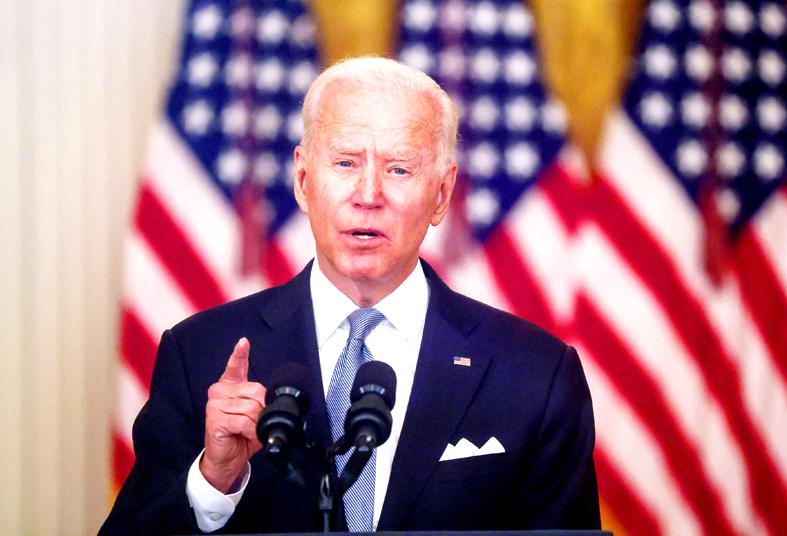US policy on Taiwan has not changed, a Washington official said after US President Joe Biden appeared to suggest that the US would defend Taiwan if it were attacked, a deviation from a long-held US position of “strategic ambiguity.”
In an interview aired by ABC News on Thursday, Biden was asked about the effects of the chaotic US withdrawal from Afghanistan and responses in Chinese media telling Taiwan this showed Washington could not be relied on to come to its defense.
Biden replied that Taiwan, South Korea and NATO were fundamentally different situations to Afghanistan and appeared to lump Taiwan together with countries to which Washington has explicit defense commitments.

Photo: Reuters
“They are ... entities we’ve made agreements with based on not a civil war they’re having on that island or in South Korea, but on an agreement where they have a unity government that, in fact, is trying to keep bad guys from doing bad things to them,” he said.
“We have made — kept every commitment. We made a sacred commitment to Article 5 that if in fact anyone were to invade or take action against our NATO allies, we would respond. Same with Japan, same with South Korea, same with — Taiwan. It’s not even comparable to talk about that,” he added.
A senior Biden administration official said that the US “policy with regard to Taiwan has not changed” and analysts said it appeared that Biden had misspoken.
In Taipei, Presidential Office spokesman Xavier Chang (張惇涵) said they had “noted” Biden’s comments, and thanked his administration for “continuing to take practical actions” to show its “rock-solid” commitment to Taiwan in areas such as arms sales.
President Tsai Ing-wen (蔡英文) has emphasized that Taiwan’s “only choice” is to demonstrate its resolve in matters of self-defense, Chang added.
China’s embassy in Washington did not immediately respond to requests for comment.
While Washington is required by law to provide Taiwan with the means to defend itself, it has long followed a policy of “strategic ambiguity” on whether it would intervene militarily to protect Taiwan in the event of a Chinese attack.
Article 5 is a NATO agreement that states that an attack on one member of the alliance is viewed as an attack on all.
South Korea is also a US treaty ally with a mutual defense agreement, but US relations with Taiwan have been unofficial since Washington switched diplomatic recognition to Beijing in 1979.
Some prominent US academics and others have said that Washington should give Taiwan a more explicit security guarantee in light of increasing military pressure from Beijing, but US National Security Council Coordinator for the Indo-Pacific Kurt Campbell has appeared to reject this, saying in May that there were “significant downsides” to such an approach.
US National Security Adviser Jake Sullivan was asked about Taiwan this week and called it a “fundamentally different question in a different context” to Afghanistan.
“We believe our commitment to Taiwan ... remains as strong as it’s ever been,” he said, without specifying what the commitment was.
Additional reporting by CNA

US President Donald Trump yesterday announced sweeping "reciprocal tariffs" on US trading partners, including a 32 percent tax on goods from Taiwan that is set to take effect on Wednesday. At a Rose Garden event, Trump declared a 10 percent baseline tax on imports from all countries, with the White House saying it would take effect on Saturday. Countries with larger trade surpluses with the US would face higher duties beginning on Wednesday, including Taiwan (32 percent), China (34 percent), Japan (24 percent), South Korea (25 percent), Vietnam (46 percent) and Thailand (36 percent). Canada and Mexico, the two largest US trading

AIR SUPPORT: The Ministry of National Defense thanked the US for the delivery, adding that it was an indicator of the White House’s commitment to the Taiwan Relations Act Deputy Minister of National Defense Po Horng-huei (柏鴻輝) and Representative to the US Alexander Yui on Friday attended a delivery ceremony for the first of Taiwan’s long-awaited 66 F-16C/D Block 70 jets at a Lockheed Martin Corp factory in Greenville, South Carolina. “We are so proud to be the global home of the F-16 and to support Taiwan’s air defense capabilities,” US Representative William Timmons wrote on X, alongside a photograph of Taiwanese and US officials at the event. The F-16C/D Block 70 jets Taiwan ordered have the same capabilities as aircraft that had been upgraded to F-16Vs. The batch of Lockheed Martin

GRIDLOCK: The National Fire Agency’s Special Search and Rescue team is on standby to travel to the countries to help out with the rescue effort A powerful earthquake rocked Myanmar and neighboring Thailand yesterday, killing at least three people in Bangkok and burying dozens when a high-rise building under construction collapsed. Footage shared on social media from Myanmar’s second-largest city showed widespread destruction, raising fears that many were trapped under the rubble or killed. The magnitude 7.7 earthquake, with an epicenter near Mandalay in Myanmar, struck at midday and was followed by a strong magnitude 6.4 aftershock. The extent of death, injury and destruction — especially in Myanmar, which is embroiled in a civil war and where information is tightly controlled at the best of times —

China's military today said it began joint army, navy and rocket force exercises around Taiwan to "serve as a stern warning and powerful deterrent against Taiwanese independence," calling President William Lai (賴清德) a "parasite." The exercises come after Lai called Beijing a "foreign hostile force" last month. More than 10 Chinese military ships approached close to Taiwan's 24 nautical mile (44.4km) contiguous zone this morning and Taiwan sent its own warships to respond, two senior Taiwanese officials said. Taiwan has not yet detected any live fire by the Chinese military so far, one of the officials said. The drills took place after US Secretary